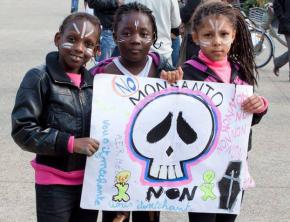Century of innovating toxins
Monsanto has a long history of threatening the health of animals, humans and the planet--which is why it's the target of protest, reports .
THE MILLIONS Against Monsanto campaign held a global day of action on October 12 to protest the use of genetically modified organisms (GMOs) and other harmful agro-chemicals that pose a threat to the global food supply. Events took place in more than 400 cities and 57 countries around the world. In the U.S., there were protests in 47 of the 50 states, and in Northern California alone, there were more than 13 actions, including protests in Vallejo, Sacramento and San Francisco.
For years, activists and experts have criticized Monsanto, one of the world's largest agribusiness corporations, for a host of reasons, including its seed patent policies that put small farmers out of business, its ownership of 90 percent of the world's seed and poisonous pesticides, and the revolving door that turns Monsanto executives into government officials responsible for agribusiness regulation (and vice versa).
In San Francisco, participants in the day of action there gathered at noon to march across the Golden Gate Bridge in bee costumes, corn monster attire and biohazard suits, carrying cans of pesticide and accompanied by a marching band.

Speakers addressed issues such as human health and environmental risks, problems associated with genetically modified seed, water rights, super worms, patenting, cross-contamination and more.
"Seed Giants vs. U.S. Farmers," a recent report by the Center for Food Safety, summarizes the many problems with current seed patenting policy, which has produced a lack of seed diversity and skyrocketing seed prices, while reducing independent scientific research on human health as well as the environment. Monsanto has patent rights on more than 96 percent of the genetically modified seeds planted in the U.S.
In the 2012 election cycle, Monsanto and other biotech companies raised more than $91 million to spend on federal candidates from both parties in order to make sure that a tide of corporate-friendly legislation continues flowing out of Congress. Last month, the Senate and House passed a bill known by critics as the Monsanto Protection Act.
By attaching a rider to a fiscal bill, legislators ensured that farmers can continue planting genetically modified crops even before the U.S. Department of Agriculture is able to perform a sufficient environmental impact assessment. The GMO rider, originally introduced in March 2013, was set to expire on September 30, but in the absence of a new bill, the existing law was extended, thus keeping the provision in place for at least three more months.
The rider essentially violates the separation of executive and judicial powers by giving powerful corporations the leverage they need to get courts to dismiss cases challenging GMO crops. Small organic and anti-GMO farmers no longer have judicial recourse when genetically engineered crops become cross-contaminated with their produce.
MONSANTO HAS a long history of toxic "innovations," including the weed killer Roundup, recombinant bovine growth hormone (or rBGH, which is commercially known as Posilac) used to increase milk production by cows, and the patenting of genetically modified organisms.
But that's not all.
According to Food and Water Watch's April 2013 report "Monsanto: A Corporate Profile," Monsanto started in 1901 as a chemical company that manufactured wholesale drugs. The company then patented saccharin, a sugar substitute, and supplied it to Coca-Cola. By the 1970s, Monsanto had a long list of moneymakers that helped it fatten its bottom line, including aspirin, laxatives, plastics, rubber goods, pesticides, PCBs (polychlorinated biphenyls) and fertilizers.
Monsanto also created Agent Orange, a defoliant herbicide containing the powerful toxin dioxin, which was used by the U.S. military during the Vietnam War to destroy lush jungle landscapes used as cover by the guerrilla fighters being stalked by U.S. troops. The U.S. dumped nearly 19 million gallons of Agent Orange on Vietnam between 1962 and 1971, leading to 400,000 people killed or maimed and 500,000 children born with birth defects. Some 50 illnesses and diseases and 20 separate birth defects are connected to Agent Orange.
In 1982, Monsanto scientists were the first to genetically modify a plant cell, spurring the company to sink investments in seed and agricultural companies. Today, the company owns 404 facilities in 66 countries spread over six continents. Among the facilities, seven in the U.S. have been deemed contaminated and rank among the worst designated by the EPA fund for clean up.
Despite its condemned facilities, the company is able to continue business-as-usual even as small organic farmers are forced out of business when they are sued by Monsanto for supposed copyright infringement when Monsanto's GMO seeds cross-pollinate with their crops.
Meanwhile, the nature and the scale of the risks posed by Monsanto's GMOs continue to be a source of controversy. Monsanto funds research "proving" that GMOs are safe to eat, but unbiased research shows that food from Monsanto's seed stocks can cause human health issues.
In its drive to bottle up scientific studies that pose a threat to its bottom line, Monsanto has sought influence at the highest levels of research institutions and government regulatory agencies. Currently, a Monsanto employee serves as a board member or senior staffer at Arizona State University, Cornell University of Missouri and the United Kingdom Academy of Medicine, to name just a few.
Michael Taylor, a former lawyer for Monsanto, is currently deputy commissioner of the Food and Drug Administration. Monsanto also has current and former ties to the Department of Defense, Department of State, the U.S. Trade Representatives, the EPA, Supreme Court, the White House, the Social Security Administration, the Department of Commerce and the Federal Reserve Bank of Cleveland.
The nonstop revolving door effect allows Monsanto to continue unethical, unsafe and unhealthy business practices by undermining the voice of the people--workers and consumers alike--deeply affected by Monsanto's ruthless drive for profits.


